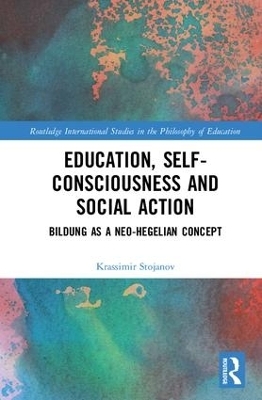
Education, Self-consciousness and Social Action
Bildung as a Neo-Hegelian Concept
Seiten
2018
Routledge (Verlag)
978-1-138-06312-9 (ISBN)
Routledge (Verlag)
978-1-138-06312-9 (ISBN)
Education, Self-Consciousness and Social Action reconstructs the Hegelian concept of education, Bildung, and shows that this concept could serve as a powerful alternative to current psychologist notions of learning.
Education, Self-consciousness and Social Action reconstructs the Hegelian concept of education, Bildung, and shows that this concept could serve as a powerful alternative to current psychologist notions of learning. Taking a Hegelian perspective, Stojanov claims that Bildung should be interpreted as growth of mindedness and that such a growth has two central and interrelated components, including the development of self-consciousness toward conceptual self-articulation and the formation of one’s capacity for intelligent social action.
The interrelation between the two central components of education implies that learning is transformed into education only when it involves the self-consciousness and the identity of the learner. Since both are grounded in the ethical beliefs and values of the individual, transforming learning into education therefore requires that education also address students’ everyday ethical assumptions, as well as their articulation and conceptualization. This claim has a number of implications for educational policy and pedagogy; one being that learning and teaching in schools are educative only if they have ethical significance for both students and teachers. Another implication is that the point of departure for educative teaching becomes the actual, everyday ethical beliefs and experiences of the students, rather than fixed curricular contents. Students’ encountering with sciences and arts should aim at the conceptual articulation of those beliefs and experiences – an articulation which makes individual’s rational autonomy and self-determination possible.
Education, Self-consciousness and Social Action will be of great interest to academics, researchers and postgraduate students interested in the philosophy of education. It should also be essential reading for anyone engaged in the study of Hegel’s work.
Education, Self-consciousness and Social Action reconstructs the Hegelian concept of education, Bildung, and shows that this concept could serve as a powerful alternative to current psychologist notions of learning. Taking a Hegelian perspective, Stojanov claims that Bildung should be interpreted as growth of mindedness and that such a growth has two central and interrelated components, including the development of self-consciousness toward conceptual self-articulation and the formation of one’s capacity for intelligent social action.
The interrelation between the two central components of education implies that learning is transformed into education only when it involves the self-consciousness and the identity of the learner. Since both are grounded in the ethical beliefs and values of the individual, transforming learning into education therefore requires that education also address students’ everyday ethical assumptions, as well as their articulation and conceptualization. This claim has a number of implications for educational policy and pedagogy; one being that learning and teaching in schools are educative only if they have ethical significance for both students and teachers. Another implication is that the point of departure for educative teaching becomes the actual, everyday ethical beliefs and experiences of the students, rather than fixed curricular contents. Students’ encountering with sciences and arts should aim at the conceptual articulation of those beliefs and experiences – an articulation which makes individual’s rational autonomy and self-determination possible.
Education, Self-consciousness and Social Action will be of great interest to academics, researchers and postgraduate students interested in the philosophy of education. It should also be essential reading for anyone engaged in the study of Hegel’s work.
Krassimir Stojanov is Professor and Chair of Philosophy of Education and Educational Theory at the Catholic University of Eichstaett-Ingolstadt.
Introduction 1. Human Development from an Educationist Perspective 2. Hegel’s Concept of Bildung 3. Toward a Neo-Hegelian Theory of Bildung 4. Bildung and Schooling Conclusion
| Erscheinungsdatum | 25.01.2018 |
|---|---|
| Reihe/Serie | Routledge International Studies in the Philosophy of Education |
| Verlagsort | London |
| Sprache | englisch |
| Maße | 156 x 234 mm |
| Gewicht | 453 g |
| Themenwelt | Geisteswissenschaften ► Philosophie ► Geschichte der Philosophie |
| Geisteswissenschaften ► Philosophie ► Philosophie der Neuzeit | |
| Sozialwissenschaften ► Pädagogik ► Allgemeines / Lexika | |
| Sozialwissenschaften ► Pädagogik ► Bildungstheorie | |
| ISBN-10 | 1-138-06312-6 / 1138063126 |
| ISBN-13 | 978-1-138-06312-9 / 9781138063129 |
| Zustand | Neuware |
| Haben Sie eine Frage zum Produkt? |
Mehr entdecken
aus dem Bereich
aus dem Bereich
die kolonialen Wurzeln der französischen Theorie
Buch | Hardcover (2024)
Matthes & Seitz Berlin (Verlag)
28,00 €
eine Geschichte der Zuversicht von Homer bis zum Klimawandel
Buch | Hardcover (2024)
C.H.Beck (Verlag)
28,00 €


